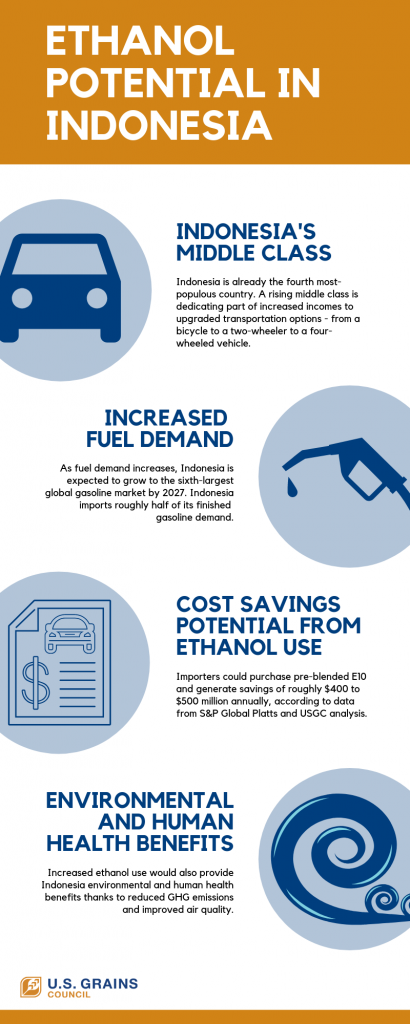Ethanol could generate significant cost savings while boosting octane in fuel supplies in Indonesia. That’s the message the U.S. Grains Council (USGC) and its partners are conveying to Indonesian importers and government agencies to promote increased ethanol use in one of the world’s largest and fastest-growing gasoline markets.
Already the fourth most-populous country, members of Indonesia’s rising middle class are dedicating part of their increased incomes to upgraded transportation options – from a bicycle to a two-wheeler to a four-wheeled vehicle. As they do so, Indonesia is expected to grow to the sixth-largest global gasoline market by 2027.
“Indonesia has great economic potential with fuel consumption expected to rise significantly as the economy grows,” said Manuel Sanchez, USGC regional director for Southeast Asia. “The Council is working with our partner organizations to demonstrate economic and other benefits of ethanol use as gasoline imports increase.”
Indonesia currently imports half of its finished gasoline demand, equating to 4.94 billion gallons in 2017, according to the U.S. Department of Agriculture’s Foreign Agricultural Service (USDA’s FAS). Finished gasoline qualifies for duty-free access into Indonesia, meaning importers could purchase pre-blended E10 and generate savings of roughly $400 to $500 million annually, according to data from S&P Global Platts and USGC analysis.
For comparison, Indonesia is currently relying on aromatics and/or benzene for octane, which are at a price premium to ethanol. According to data from S&P Global Platts and USGC analysis, ethanol is trading at a $1.43 discount to weighted BTX in the region. By reducing the use of aromatics and blending E10, Indonesia could save upwards of 10 cents per gallon in fuel costs.
“The immediate cost-savings for using ethanol in Indonesia would be significant,” Sanchez said. “With global availability and momentum, the Council is working to disseminate critical research and technical information resources to support expanded global use and trade of ethanol.”
At the same time, the Indonesian government has set goals of achieving 23 percent of its energy needs from renewable resources by 2025 and reducing greenhouse gas emissions (GHG) by 29 percent by 2030. As a result, the Indonesian government is looking for ways to improve the environment and address human health, particularly in terms of improving air quality. Ethanol can help Indonesia meet these ambitious environmental goals by reducing the carbon intensity of the country’s transportation fuels and decreasing particulate matter and toxic emissions, both of which are harmful to the population.
The Council conducted an in-country assessment in Indonesia in December 2017, followed by participation in a USDA Agricultural Trade Mission there in July 2018. Throughout these activities, Council staff have continued to work with FAS officials to interface with the Indonesian government and government-owned oil industry to demonstrate the long-term value of ethanol use.
With additional funding from USDA’s Agricultural Trade Promotion (ATP) program, the Council is expanding its presence in Southeast Asia through a role designated to engage both gasoline suppliers in Indonesia and regional suppliers in Singapore and Malaysia on supporting increased ethanol usage.
“Other Southeast Asian markets are already capturing the full range of economic, environmental and health benefits associated with increased ethanol use,” Sanchez said. “The Council and its partners will continue working with local leaders to realize these same advantages in Indonesia.”
About The U.S. Grains Council
The U.S. Grains Council develops export markets for U.S. barley, corn, sorghum and related products including distiller’s dried grains with solubles (DDGS) and ethanol. With full-time presence in 28 locations, the Council operates programs in more than 50 countries and the European Union. The Council believes exports are vital to global economic development and to U.S. agriculture’s profitability. Detailed information about the Council and its programs is online at www.grains.org.

